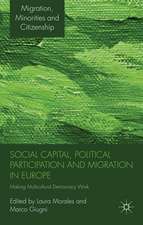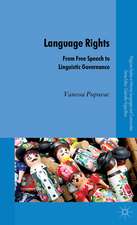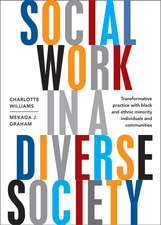Ethnic Cleansing and the European Union: An Interdisciplinary Approach to Security, Memory and Ethnography: Rethinking Peace and Conflict Studies
Autor L. Tesseren Limba Engleză Hardback – 14 mai 2013
| Toate formatele și edițiile | Preț | Express |
|---|---|---|
| Paperback (1) | 385.84 lei 6-8 săpt. | |
| Palgrave Macmillan UK – 2013 | 385.84 lei 6-8 săpt. | |
| Hardback (1) | 391.61 lei 6-8 săpt. | |
| Palgrave Macmillan UK – 14 mai 2013 | 391.61 lei 6-8 săpt. |
Din seria Rethinking Peace and Conflict Studies
-
 Preț: 113.00 lei
Preț: 113.00 lei - 20%
 Preț: 565.31 lei
Preț: 565.31 lei -
 Preț: 318.69 lei
Preț: 318.69 lei -
 Preț: 357.93 lei
Preț: 357.93 lei -
 Preț: 272.92 lei
Preț: 272.92 lei -
 Preț: 387.20 lei
Preț: 387.20 lei - 15%
 Preț: 574.77 lei
Preț: 574.77 lei - 15%
 Preț: 699.45 lei
Preț: 699.45 lei - 15%
 Preț: 646.62 lei
Preț: 646.62 lei - 15%
 Preț: 639.25 lei
Preț: 639.25 lei -
 Preț: 390.63 lei
Preț: 390.63 lei - 15%
 Preț: 644.30 lei
Preț: 644.30 lei -
 Preț: 390.63 lei
Preț: 390.63 lei - 15%
 Preț: 644.95 lei
Preț: 644.95 lei -
 Preț: 392.21 lei
Preț: 392.21 lei -
 Preț: 384.86 lei
Preț: 384.86 lei -
 Preț: 387.58 lei
Preț: 387.58 lei -
 Preț: 386.99 lei
Preț: 386.99 lei -
 Preț: 385.84 lei
Preț: 385.84 lei -
 Preț: 388.72 lei
Preț: 388.72 lei -
 Preț: 390.63 lei
Preț: 390.63 lei -
 Preț: 389.49 lei
Preț: 389.49 lei -
 Preț: 391.61 lei
Preț: 391.61 lei -
 Preț: 390.63 lei
Preț: 390.63 lei -
 Preț: 389.88 lei
Preț: 389.88 lei -
 Preț: 386.39 lei
Preț: 386.39 lei -
 Preț: 426.56 lei
Preț: 426.56 lei -
 Preț: 389.88 lei
Preț: 389.88 lei -
 Preț: 389.88 lei
Preț: 389.88 lei -
 Preț: 417.14 lei
Preț: 417.14 lei - 15%
 Preț: 699.93 lei
Preț: 699.93 lei -
 Preț: 392.60 lei
Preț: 392.60 lei -
 Preț: 390.63 lei
Preț: 390.63 lei -
 Preț: 389.11 lei
Preț: 389.11 lei - 18%
 Preț: 783.25 lei
Preț: 783.25 lei -
 Preț: 392.60 lei
Preț: 392.60 lei -
 Preț: 388.72 lei
Preț: 388.72 lei -
 Preț: 388.72 lei
Preț: 388.72 lei -
 Preț: 388.52 lei
Preț: 388.52 lei
Preț: 391.61 lei
Nou
Puncte Express: 587
Preț estimativ în valută:
74.93€ • 78.24$ • 62.02£
74.93€ • 78.24$ • 62.02£
Carte tipărită la comandă
Livrare economică 05-19 aprilie
Preluare comenzi: 021 569.72.76
Specificații
ISBN-13: 9781137308764
ISBN-10: 1137308761
Pagini: 268
Ilustrații: XIII, 268 p.
Dimensiuni: 140 x 216 x 23 mm
Greutate: 0.5 kg
Ediția:2013
Editura: Palgrave Macmillan UK
Colecția Palgrave Macmillan
Seria Rethinking Peace and Conflict Studies
Locul publicării:London, United Kingdom
ISBN-10: 1137308761
Pagini: 268
Ilustrații: XIII, 268 p.
Dimensiuni: 140 x 216 x 23 mm
Greutate: 0.5 kg
Ediția:2013
Editura: Palgrave Macmillan UK
Colecția Palgrave Macmillan
Seria Rethinking Peace and Conflict Studies
Locul publicării:London, United Kingdom
Cuprins
PART I: BACKGROUND AND THEORY 1. Introduction 2. Concepts, Methods and an Explanatory Frame 3. The Regime of Ethnic Separation PART II: COUNTRY CASES 4. Poland: Ethnic Separation in Extremis and EU Expansion 5. Czech Republic: the Beneš Decrees and EU Expansion 6. Cyprus: A Divided Island in the EU 7. Slovenia and Croatia: the Aftermath of Italian, German, and Serb Mass Population Movements and EU Accession 8. Bosnia-Herzegovina: A Divided State, EU Expansion, and Prospects for a Politics of Remixing 9. Conclusion Bibliography Index
Recenzii
"Lynn Tesser has written an important book that epitomizes the best traits of good comparative research: strong theoretical foundations and an engaging and innovative empirical structure. Her ability to cover diverse regions and periods has enabled her to provide us with crucial insights into how far Europe has come in its understanding of and responses to forced migrations, 'ethnic cleansing', and ultimately genocide. Tesser's disturbing and well-argued conclusion is: not nearly far enough."
- Josip Glaurdic, Department of Politics and International Studies, University of Cambridge, UK
"Tesser draws together a wide range of theoretical perspectives and combines them with rich historical detail to provide a fresh look at the politics of ethnic separation and subsequent remixing. Her thought provoking analysis will be of interest to students, researchers and policy makers concerned with nationalism and ethnic conflict."
- Jennifer Jackson-Preece, London School of Economics, UK
''Academics will appreciate Tesser's clear exposition of her analytical framework whereby her quadratic nexus, with appropriate modifications, is likely to remain productive for the foreseeable future, whether by providing the impetus for eureka moments for those struggling to frame similar interdisciplinary, comparative projects or by raising scholarly hackles among students of politics, memory, regime theory and history.'' - Steven Jefferson, University of London(IMLR), UK
'[The book's] main contribution certainly lies in drawing readers' attention to the after-effects of the European politics of separation in the context of the current premium on European integration The book offers analyses of a considerable number of contexts: Poland; Czech Republic; Cyprus; Slovenia and Croatia; and Bosnia & Hercegovina. All case study chapters cover the history of each case's internationally sanctioned ethnic separation, threat perceptions and the politicisation of potential expellee return in the context of European integration. There are clear parallels between cases. Also, rich empirical detail is provided in support of Tesser's core argument which states that the variation between countries as regards the resurgence of ethnic tensions in the context of EU accession can be explained by variation in the 'quadratic nexus' (comprising geographical proximity, selective memory, expellee activism and pressures deriving from international integration).' - Ada-Charlotte Regelmann (2015) Ethnic Cleansing and the European Union. An Interdisciplinary Approach to Security, Memory and Ethnography, Europe-Asia Studies, 67:3, 507-509
- Josip Glaurdic, Department of Politics and International Studies, University of Cambridge, UK
"Tesser draws together a wide range of theoretical perspectives and combines them with rich historical detail to provide a fresh look at the politics of ethnic separation and subsequent remixing. Her thought provoking analysis will be of interest to students, researchers and policy makers concerned with nationalism and ethnic conflict."
- Jennifer Jackson-Preece, London School of Economics, UK
''Academics will appreciate Tesser's clear exposition of her analytical framework whereby her quadratic nexus, with appropriate modifications, is likely to remain productive for the foreseeable future, whether by providing the impetus for eureka moments for those struggling to frame similar interdisciplinary, comparative projects or by raising scholarly hackles among students of politics, memory, regime theory and history.'' - Steven Jefferson, University of London(IMLR), UK
'[The book's] main contribution certainly lies in drawing readers' attention to the after-effects of the European politics of separation in the context of the current premium on European integration The book offers analyses of a considerable number of contexts: Poland; Czech Republic; Cyprus; Slovenia and Croatia; and Bosnia & Hercegovina. All case study chapters cover the history of each case's internationally sanctioned ethnic separation, threat perceptions and the politicisation of potential expellee return in the context of European integration. There are clear parallels between cases. Also, rich empirical detail is provided in support of Tesser's core argument which states that the variation between countries as regards the resurgence of ethnic tensions in the context of EU accession can be explained by variation in the 'quadratic nexus' (comprising geographical proximity, selective memory, expellee activism and pressures deriving from international integration).' - Ada-Charlotte Regelmann (2015) Ethnic Cleansing and the European Union. An Interdisciplinary Approach to Security, Memory and Ethnography, Europe-Asia Studies, 67:3, 507-509
Notă biografică
Lynn M. Tesser has spent over four years teaching and researching in Central Europe, the Balkans, and Cyprus. Tesser has held academic affiliations in the U.S., Germany, Poland, Bosnia-Herzegovina, Finland, and Cyprus, and received fellowships from the Fulbright Commission, Social Science Research Council, MacArthur and Mellon Foundations, among others. Her work on nationalism, EU expansion, and forced migration has been published in East European Politics and Societies, Communist and Post-Communist Studies, and Geopolitics. She holds a Ph.D. in political science from the University of Chicago, U.S.














